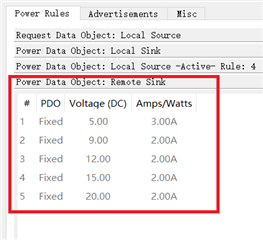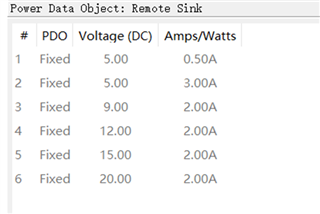Other Parts Discussed in Thread: TPS25750, , TPS25730, BQ25792, BQ40Z50
Tool/software:
Hello Chris:
We have tested the BIN file, and use the PD tester read the information. It shows:

When read the old BIN file for TPS25750, it has 5V 0.5A.

I think the old BIN file use one of the PDO to cover the legacy USB ports. Could we do this for TPS25751?
Also for 5V 3A, the actually input current is 2.4A, is this normal? The old TPS25750 can have 2.8A.
Thank you!
Chen


